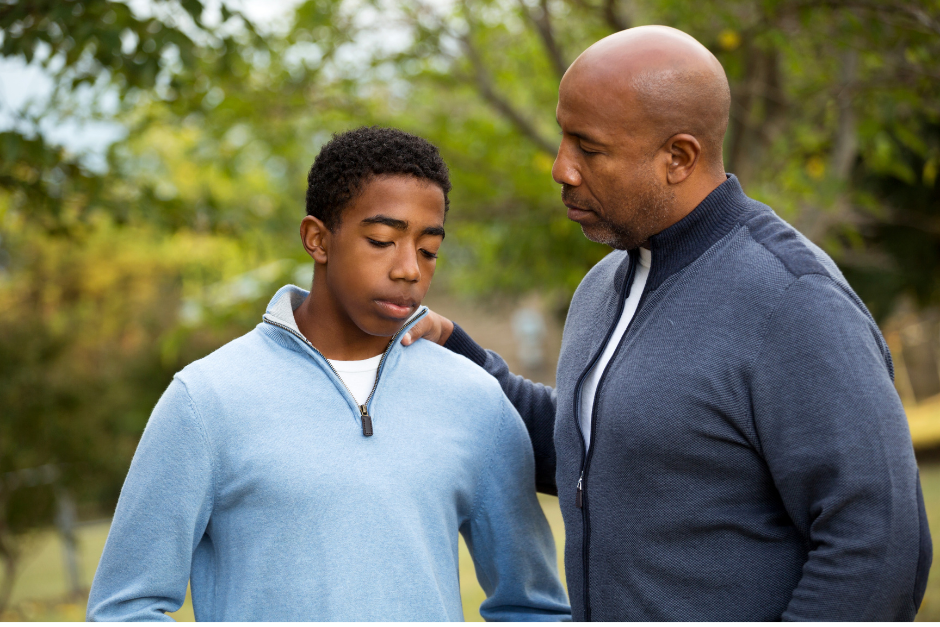If you’ve recently seen significant changes in your child’s personality and behavior – they’ve shut down and are spending all their time alone in their room, they no longer participate in activities they always enjoyed, they aren’t spending time with friends or their grades have plummeted – you may be observing signs of a mental health issue.
As parents and caregivers, we naturally want to find out what is going on and help our children feel better. But how do you start the conversation? Talking to your adolescent or teen about anything can be like pulling teeth. When the topic is their mental health it’s even harder because of the self-blame and shame young people who struggle with anxiety, depression and other issues often feel.
It’s easier when you already have open lines of communication with your child. A young person who trusts their parent to listen with compassion and without judgment, is more likely to engage, even when it is an uncomfortable subject.
Proceed with caution and patience.
Here are some strategies for starting a productive conversation about mental health with your child:
- Choose the right time – Don’t try to talk to your child when they’ve had a bad day or are busy. Find a time when both you and your child are relaxed and won’t be distracted or interrupted. Sometimes it helps to be doing another activity that doesn’t require much eye contact like driving in the car, walking the dog or washing dishes.
- Ask a leading question – Base your question on something you have observed, without judgment or opinions: “I’ve noticed that you haven’t been spending time with your friends recently. Is everything okay?” If your first efforts are shut down, don’t give up. Leave room for future conversations. Let your child know that you love and support them and are there for them if they want to talk about anything that is bothering them.
- Once you’ve asked a question, don’t be afraid of silence – Allow your child time to think about your question and formulate a response. Don’t feel compelled to take over the conversation by filling the silence.
- Listen – Listen carefully, without jumping in and trying to solve their problem, becoming defensive or trying to correct your child’s perceptions of a situation.
- Show your child you’ve heard them – Reflect back to them what they said: “It sounds like when your friend did X, it made you feel like they turned against you and that’s been really upsetting.” You can follow up with additional open questions about the situation or their feelings. But don’t keep digging if your child wants to end the conversation there. If they don’t feel pressured, they will be more likely to come back to you at another time.
- Do not minimize or downplay what they are telling you. To you, it may look like a minor issue that can be resolved. But the situation affecting your child is significant to them and should be taken seriously.
- Share your own mental health experiences. If you have struggled with your mental health, sharing your experience and feelings may encourage your child to share theirs. It can also help them feel less alone.
- Ask your child what they need from you – Sometimes kids just need to talk. Other times, they may need an adult to step in as an advocate or to help them get the support they need.
- Regulate your response – It can be hard not to have a big emotional reaction to something your child is telling you – especially if they mention suicide or self-harm. But if you want to keep the line of communication open, it is critical to stay calm and respond with compassion and curiosity, instead of fear or despair.
- If your child mentions death or suicide, follow up with explicit questions – “Have you ever thought about ending your life?” is hard to ask, but critical. If your child responds in the affirmative, it is important to evaluate the severity of the situation and seek professional help. If they tell you they want to act on these thoughts or have been planning how to hurt themselves, immediately take them to the emergency room.
- Get help – When your child is not willing to talk to you, ask them if they might feel more comfortable talking to a school counselor or a therapist. Encourage them to take advantage of the numerous resources that are available for young people (An extensive list can be found on the Society for Adolescent Health and Medicine website.) If you worry that your child may at some point need crisis support, make them aware of the National Suicide Prevention Lifeline number 1-800-273-TALK.
Even when you have an open line of communication with your child, it is okay to let them know that you don’t have all the answers. A mental health professional can help both of you take the next steps in getting your child the support they need.

